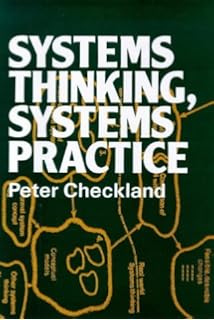
Breaking News
Peter Checkland Soft Systems Methodology Ebook Readers
вторник 02 октября admin 24
Oct 30, 1990 - Soft Systems Methodology in Action 'Whether by design, accident or merely synchronicity, Checkland appears to have developed a habit of.
Journal of the Operational Research Society T.G. GOUGH - This book is divided primarily into three parts, with Part I preceded by a Preface and Chapter 1 and Part III followed by an Appendix containing the text of a lecture given by Peter Checkland to the Institute of Chartered Secretaries and Administrators. Part I is entitled 'Soft Systems Methodology and its Application in Different Contexts', Part II 'Soft Systems Methodology in Action-Learning through Use', and Part III 'Learning from Real-World Research'. The structure of the book is described by the authors in Chapter 1, which provides an introduction to the whole. The authors state that, although any of the systems studies described in Chapters 3 to 9 can be read separately and make sense to anyone with a basic knowledge of SSM, the book is intended to convey a sense of the overall learning achieved during the methodology's second decade. Chapter 2 gives an account of SSM in its 'late 1980s' form and Chapters 3, 4 and 5 illustrate the use of SSM in three different contexts: industry, the National Health Service and the Civil Service.
Chapters 6, 7 and 8 describe a sequence of studies undertaken in ICL and how these changed and enriched the authors' perception of SSM. Chapter 9 describes another industrial study (in Shell) and illustrates a sophisticated flexible use of SSM in its modern form.
Chapter 10 summarizes the learning from the last decade. To quote from the Preface, 'In fact the experiences of the last decade have not simply enriched our view of SSM, they have changed it radically, as Part II indicates. The authors anticipate that there will be an element of surprise, especially in Chapter 2 and in Chapters 6-10, even for knowledgeable readers.' Having taken the reader through the learning experiences set out in the earlier chapters, in Chapter 10 the authors describe the outcome of those experiences, 'the recognition of a spectrum of (in-principle) use of SSM from, on the one hand, a formal stage-by-stage application of the methodology (let us call it Mode 1) to, on the other, internal mental use of it as a thinking mode (which we will call Mode 2)'.
Tincore Keymapper 3.7.2 APK Download Tincore Keymapper 3.7.2.apk apk Black files version 3.7.2 com.tincore.and.keymapper Size is 16599961 md5 is a238d06760b9f8675e8adbe63779d565 Updated In 2014-12-15 By Tincore This Version Need Gingerbread 2.3 - 2.3.2 API level 9, NDK 5 or higher • Comid: com.tincore.and.keymapper • Keywords: tincore,keymapper,tools • Version: 3.7.2 (3726 code) • Dev: Tincore • Requirement: Gingerbread 2.3 - 2.3.2 API level 9, NDK 5 or higher • Updated: 2014-12-15 • size: 15.83 MB (16599961 Byte) • MD5: a238d06760b9f8675e8adbe63779d565 • Cpu: x86,armeabi • Screen: SMALL. Tincore keymapper full apk download.
Further discussion leads to an account of the 'new Constitutive Rules of SSM' later in this same chapter, followed by a model of the 'system to use SSM.' The book is well produced, with clear text and a wealth of illustrations. There are few typographical errors, though two occur in a single sentence. However, at times it is difficult to read, with the impression given that the authors are trying too hard to make their 'academic' case. Towards the end of the book the authors castigate others for their 'misguided zeal' in comparing methodologies but do not make it clear to this reviewer why, if they can apply their '3 or 5 Es' to systems being modelled, these criteria cannot also be applied to methodologies.
Keygen for autocad 2013 64 bit download. Anda bisa menemukan artikel ini dengan url, Jika sekiranya artikel Download Autocad 2013 32 64 Bit Full Version ini sangat bermanfaat bagi sobat dan mungkin teman sobat, sebarluaskan tapi dengan menyertakan link sebagai sumbernya.
The final sentence of Chapter 1 reads, 'After reading SSM in Action interested persons should be well able to use the approach in a way comfortable for them in relation to situations about which they are concerned.' Only the individual reader can decide whether the authors have achieved this aim. However, every reader should find a lot of food for thought in the experiences described in this book.
'Thirty years ago Peter Checkland set out to test whether the Systems Engineering (SE) approach, highly successful in technical problems, could be used by managers coping with the unfolding complexities of organizational life.' 'The straightforward transfer of SE to the broader situations of management was not possible, but by insisting on a combination of systems thinking strongly linked to real-world practice Checkland and his collaborators developed an alternative approach - Soft Systems Methodology (SSM) - which enables managers of all kinds and at any level to deal with the subtleties and confusions of the situations they face.' 'This work established the now accepted distinction between 'hard' systems thinking, in which parts of the world are taken to be 'systems' which can be 'engineered', and 'soft' systems thinking in which the focus is on making sure the process of inquiry into real-world complexity is itself a system for learning.' 'Now Peter Checkland has looked back over the three decades of SSM development, brought the account of it up to date, and reflected on the whole evolutionary process which has produced a mature SSM.' Rating: (not yet rated) Subjects • • • • More like this • •. Find more information about: ISBN: 184 OCLC Number: 45733211 Notes: 'Includes a 30 year retrospective': (p. Reproduction Notes: Electronic reproduction.